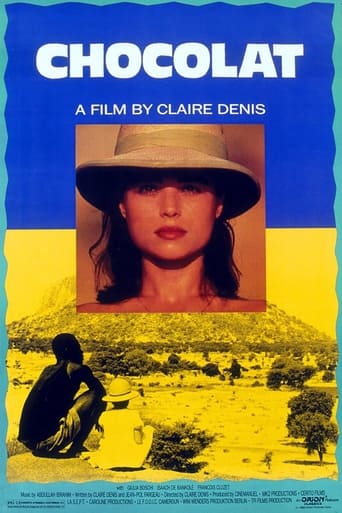tsimshotsui
Despite needing something more for me in its wrap-up, Claire Denis' Chocolat is in all ways a really good look into Cameroon and France's colonial history. Unlike the case of some films made in the US, it doesn't hammer the audience with a message about white people's ugliness, instead it just carefully shows them, and sort of leaves the audience the responsibility to observe and be horrified. It's amazing how a narrative like this with a white lead is so carefully handled that it doesn't make excuses for that privilege, and doesn't paint her as an exception or, a favorite Hollywood trope, the white savior. Isaach De Bankolé is also key here. When his character cracks it's not obvious why he does, but it's in the little expressions and reactions to the things he hears and witnesses that should explain it.
AlexLovesKissing
In Denis' debut film, she explores the social dynamics of a French household during the closing days of colonial rule in West Africa. The bulk of the film is seemingly the flashback of a young adult French woman returning to her childhood African home after living abroad - though this perspective doesn't entirely hold during certain scenes. As an American moviegoer - and thus quite familiar with the baggage of colonial rule - I wasn't surprised by any of the themes suggested/addressed by this picture: second class citizenship, interracial lust, varying degrees of loathing of the colonists toward the ruled, the inescapable resentment that the ruled have towards the colonists. Consequently, I found the film less than compelling. Though competently told, the story shed no new light the complexities of colonial rule - the suggestion that the problems of colonial rule are visible in the microcosm of a household as in the macrocosm of a revolution is nothing new. However, these politics were handled in a minimalist fashion that gave the movie a relaxed if occasionally boring pacing - a pacing that was bearable thanks to DP Robert Alazraki beautifully capturing Cameroon's landscape. I quietly recommend this movie if no other reason than the fact that it is the first film from a major new French auteur.
Heart89
By way of a woman's remembrance we are asked to reflect upon themes - coming of age, colonialism, race, religion, the power of the elements - that are often presented in a heavy-handed and awkward manner.
This film is very understated and thoughtful. There is no one single message or moral here; these are complex themes and so there is often ambiguity.I liked this film very much. I know this will seem trite, but, not many American Directors make small films like this - ones that deal with complex themes in a gentle and intelligent manner.
pablopaz
Unfortunately, because of US viewers' tendency to shun subtitles, this movie has not received the distribution nor attention it merits. Its subtle themes of belonging, identity, racial relations and especially how colonialism harms all parties, transcend the obvious dramatic tensions, the nostalgic memories of the protaganiste's childhood, and the exoticism of her relationship with her parents' "houseboy," perhaps the only "real" human she knows. We won't even look at her mother's relationship with this elegant man. There! i hope i've given you enough of a hook to take it in, whether you speak French or like subtitles or not. I challenge you to be as brave, strong and aware as La P'tite.




